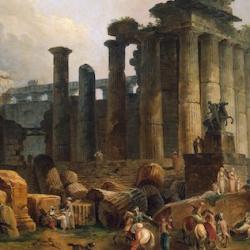In the introduction to Rhetoric and Kairos, editor Phillip Sipiora notes that “kairos first appeared in the Iliad, where it denotes a vital or lethal place in the body, one that is particularly susceptible to injury and therefore necessitates special protection; kairos thus, initially, carries a spatial meaning. In Hesiod’s Works and Days, kairos takes on the sense of ‘due measure’ or ‘proper proportion’; for example, Hesiod cites the overloading of a wagon, which can cause the axle to break.” Gradually, kairos was distinguished from chronos as a distinct sort or feature of time, the “right time” or “timing” as opposed to the fluid linear time (2).
Kairos eventually occupied a place in Greek philosophy, but Sipiora says that the notion came to have a dominant role in rhetoric: “Kairos plays a major role in the First Sophistic movement, especially in the works of Protagoras and Gorgias. The legacy of kairos continues in Aristotle’s taxonomy of rhetorical principles . . . , particularly with regard to proof and style; it also assumes major importance in Plato’s concept of a philosophic rhetoric and in Isocrates’ rhetorical paideia. In short, kairos was the cornerstone of rhetoric in the Golden Age of Greece” (3).
In rhetoric, kairos had to do with the ability to tailor a message to an intended audience, so as to move the audience: “It is necessary, according to sophistic rhetoric, that a rhetor ‘scientifically’ know the various forms of the discourse (eide ton logon), in order to avoid violating the rules of appropriateness (ton kairon me diamartein); to alter the discourse for convenience (prepontos holon ton logon katapoikilai); and to choose forms that are harmonious with each other. All of these issues demonstrate the magnitude of kairos” (4). For the Sophists, kairos was the center of rhetorical education.
Sipiora cites the work of Italian classicist Augusto Rostagni, who compares the power of kairos to the emotive power of music: “Gorgias . . . glorifies the magical effects (goeteia, psychagogia) of logos and teaches and explains that the rhetor must know, scientifically, the ways to the soul, from which the speeches capable of spellbinding and persuading descend. He is a close friend of Damone from Oa who, during the same years, in a fictitious oration addressed to the Aeropagites, defends music, showing the secret affinities that link harmony and rhythm to various psychic moods, so that harmonies and rhythms are actually capable of molding human character. The rhetor and the musician are exponents of a single, already fully-developed doctrine which includes two different subjects” (quoted 4-5).
As Eric Charles White puts it, kairos lends an improvizationality to Sophist rhetoric, which leans in a “reader-response” direction: “For Gorgias, kairos stands for a radical principle of occasionality which implies a conception of the production of meaning in language as a process of continuous adjustment to and creation of the present occasion, or a process of continuous interpretation in which the speaker seeks to inflect the given ‘text’ to his or her own ends at the same time that the speaker’s ‘text’ is ‘interpreted’ in turn by the context surrounding it” (quoted 6).















